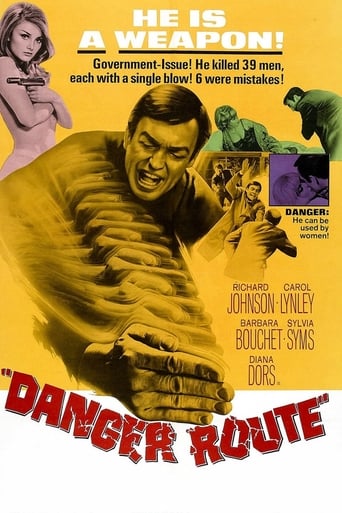JohnHowardReid
Director Seth Holt is back in fine form in this engrossing thriller which had me sitting on the edge of my seat for its whole running time of 92 minutes. (I wonder if some of the negative reviews resulted from exposure to prints that ran less than 92 minutes?) Admittedly, Holt had the advantage of an extremely lavish production, complete with fine sets and an outstanding cast, plus a script that moves at breakneck speed. This is one film that really must be seen from the very beginning. To come even a few minutes late is to rob yourself of absolutely vital information. Director Seth Holt keeps a tight rein on his material and intensifies tension with an imaginative choice of lighting and camera angles. Harry Waxman's color photography is also most effective. My only complaint is that although production credits are generally first-rate, there are a few occasions in which back projection is pretty obvious.
A_Different_Drummer
Come with me to the wonderful world of 60s spy fiction. Emboldened by the success of the Bond books and movies (Fleming wrote his novels on the beach, literally, with hunt and peck typing) the world enjoyed the greatest variety of spy fiction ever seen, present day included. Two of the most popular and critically-praised tomes, the Matt Helm series by Donald Hamilton, and the consummately perfect Jonas Wilde series by Andrew York, were serially destroyed by producers who were more interested in showing how clever they were than trying to capture the essence of the story. Jonas Wilde, as written, was a spy so well drawn that, in a showdown, you might pick him over Bond. No gadgets, no women, just a physical zeal to get the job done, and a rare (perfected) judo move which allowed him to kill with one blow (most of the time, often his back went out which reduced him to a mere mortal). This was the one and only attempt to bring Wilde to the screen, based on The Eliminator (one of the Wilde series, they are all excellent) and it is nothing short of wretched. Badly written, badly directed, showing no appreciation for the uniqueness of the character, and the lead actor so badly miscast that you wonder if he ever stopped mugging for the camera long enough to actually put some personality into his role. A travesty.
mjsseppl-imdb
To compare this film to 007 Bond films would to be lead readers astray.Bond films don't have tight plots - this film is far closer to the films and series based on John Le Carré's works. The film is never boring and seems to finish too soon - one would have liked more time for the denouement.And that is a sign of a good tight plot - when the viewer feels that the film has ended too soon.The film shows how without any gadgets and spectacular action a good plot can still hold the viewers' attention.There is action - fights and murders - but they are not spectacular - nor are they intended to be. They are cold, quick and quiet.It is an enjoyable secret service film from the 1960's - a predecessor for the excellent Le Carré films and series.Enjoy it!
vjetorix
Based on the novel `The Eliminator' by Andrew York, this deeply cynical look at the spy game is one of the unsung gems of the genre. It would be the only spy feature film in director Seth Holt's short career although he had worked on the `Danger Man' and `Espionage' television series previously. Holt would start one more film, The Curse of the Mummy's Tomb (71) but he wouldn't finish it.This is one of those movies where everyone's motives are suspect and should be for good reasons. Hardly anyone is who they seem to be and if indeed they are genuine, they end up as dead as the straw men in the end. There are many levels to Danger Route, all working to subvert our expectations as well as those of Jonas Wilde (Richard Johnson), the agent caught in the middle of the power plays going on around him.Understandably, Wilde would like to escape the game and even hands in his resignation during the course of the film. Naturally we know this is impossible. Even Whitehall is not above using a little blackmail to get their way. The freeze-frame of Wilde at the end of the film tells us that his predicament is as unchanging as that of the Cold War politics surrounding him.



